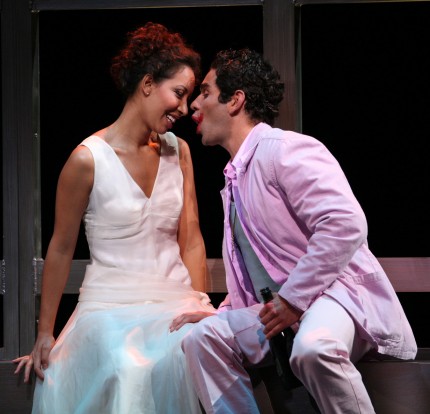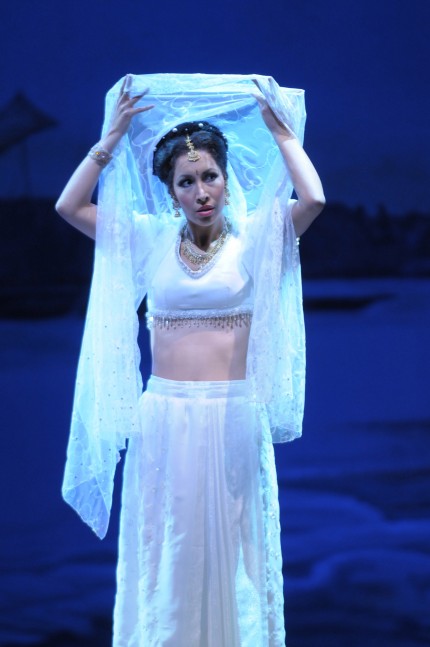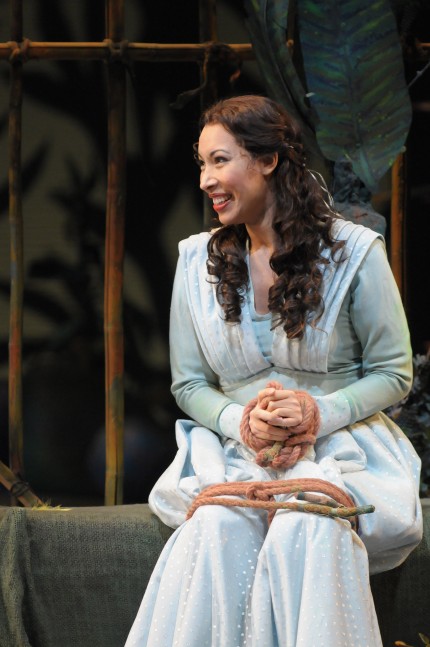Nicole Cabell: Chicago’s un-diva opera star

At a time when opera presenters are doing all they can to appear more populist and approachable, one reads countless examples of singers showing how down to earth they are by doing public appearances and meeting their fans — usually for brief CD signings — in somewhat forced attempts to show they’re just folks like the rest of us.
And then there’s Nicole Cabell. On her day off between performances of The Magic Flute at the Lyric Opera of Chicago last month, the soprano took a CTA bus downtown from her Wrigleyville apartment and schlepped across the Loop from Michigan Ave. in 20-degree weather to keep an interview appointment at the Civic Opera House. “It’s no problem,” she said. “I needed the exercise.”
Cabell can be seen this month starring as Pamina in the Lyric’s popular production of Mozart’s Masonic fantasy, which returns Wednesday and runs through Jan. 22.
The California-born singer has earned critical raves for her performance as Mozart’s heroine, which marks the Ryan Center alumna’s tenth role at Lyric Opera. More broadly, Cabell is establishing herself internationally as one of the finest lyric sopranos of our time, blessed with a gleaming technique, radiant stage presence, and a drop-dead beautiful voice.
Her pure-toned soprano has grown richer and taken on an array of colors since Cabell won the BBC Singer of the World Competition in 2005, which gave a huge launch to her career following her three years at the Lyric’s Ryan Opera Center for Young Artists (2002-2005).
“Her voice is fuller and sounds more womanly,” said Sir Andrew Davis, Lyric’s music director, who is conducting these Magic Flute performances and has been a mentor to Cabell along with wife Gianna Rolandi, director of the Ryan Center. “There’s a degree more of richness and maturity in the voice. We’re thrilled with the way her singing and career have developed.”
Speaking in her Lyric dressing room, Cabell, 34, is charming and refreshingly unpretentious, laughing easily and often, answering curveball questions candidly without hesitation and displaying a restless intellect and agile wit.
Pamina in The Magic Flute is a role that Cabell has sung in eight productions, including the current Lyric staging, and one that seems tailor-made for her silvery instrument.
“It’s one of the roles that forces you to sing well,” she says. “In some of the French repertoire, you can ‘cheat’ a little bit. But if you’re not one hundred percent singing Pamina it’s like a glaring red light is beamed on your flaws. So, you have to really be conscientious of your technique.
“And, of course, the interpretation is key, but a lot of it is written in the score, so you really can’t just concentrate on singing as beautifully as possible. It’s in a nice high range for me too, which is good, because I tend to want to sing lower, so it brings it up there for me and is more of a challenge.”
Perhaps she’s a frustrated mezzo hiding in a soprano’s voice? “I had this fantasy when I was a little girl of being a mezzo-soprano. I am the polar opposite of all others singers who dreamed of being the ‘prima donna.’ I always wanted to be the mezzo-soprano and in college I begged them to let me sing mezzo roles. They finally gave in for a couple of them. Even pants roles — I sang Arsamene in Xerxes. But it was really incorrect for my voice.”
Indeed, as the soprano has gracefully transitioned from promising young singer to bona fide opera star, Mozart has become a key part of her repertoire. Cabell has segued from roles like Zerlina, Ilia and Susanna to Pamina and Donna Elvira, a role she premiered last summer in Cologne and Berlin. She has sung the Countess three times, including at the Lyric in 2010 when she won acclaim coming in as a late substitute for an ailing Anne Schwanewilms.
“I love that role,” she said. “The Countess is a little bit less difficult to sing for me, just because of my particular voice. But it’s a more thankful role because it is sort of the ‘diva’ role. So, it’s shorter and easier but you get the recognition.”
Cabell sang her very first Pamina in 2006 at Palm Beach Opera, where she will return in February to perform another favorite role as the doomed heroine in Gounod’s Romeo et Juliette.

The role of Juliette marked one of the soprano’s first great successes when she sang the role at the Spoleto Festival in Charleston in a memorable Godfather-meets-American Gothic style production. “It was the mobster theme but there was also a David Lynch-esque quality to it too,” she recalls. “It was a little strange.”
“Juliette is one of those roles where you get to do everything. You have the same journey that happens a lot — Violetta, Leila [in The Pearl Fishers] and, of course, Pamina, where you have this girl-to-woman arc.
“But the arc is really intense for Juliette. You can think of Je veux vivre and the Potion aria as the bookends of the character. You start as a young and healthy girl and then you’re basically singing Verdi at the end of the opera! It’s a challenging role. A lot of sopranos cut out the Potion aria but it’s my favorite thing to sing.”
It’s been seven years since Cabell captured the top prize in the televised International Singer of the World Compeition in Cardiff, which effectively launched her career, Then 27, Cabell received a high-profile launch when the then-virtually unknown singer won, which led to her debut recording on Decca.
“I really thought pigs would fly before I won that competition,” she recalls. “I don’t have the loudest, fastest, highest, biggest voice. When you go into a competition, you think that’s what they’re looking for. I have to really commend the jury for just sort of seeing beyond the fireworks.
“I didn’t think I would advance to the finals at all. Competitions are so subjective. Anybody, really anybody can win. I didn’t bring an appropriate gown for it. I just literally brought something and I thought this will do. It sort of looked like my pajamas. I had to go out and buy a dress for the finals.”
The Cardiff win also led quickly to her first CD, Soprano, released on the Decca label, which Sir Andrew Davis conducted, an ongoing collaboration for which she is immensely grateful.
“That first CD was really a dream come true situation,” she recalls. “I thought, ‘My God, I can now retire happy and die happy.’ Just to have the stamp of Decca and that kind of validation on a public product like that.”
Still, despite the success and positive reviews, she has some reservations in hindsight. “To this day I wonder if I was ready for it. Because it came so fast. I’m so glad Sir Andrew was the conductor because the first couple days in the studio I had no idea what I was doing at all. Not a clue. I was singing like I was singing on stage at the Lyric. By day three, I got the hang of it and we basically used everything from those last couple days.”
Over the course of her career, Cabell says she has also learned to handle the stage nerves that she struggled with in her earlier years.
“I think if anybody tells you they don’t [have stage fright], I honestly think they’re lying. I’ve learned to channel it. Every once in a while it will get the best of me. If I am on a project where I didn’t have enough time to rehearse or I’m not prepared, the words are sort of the first thing to go.
“When you’re doing concerts or recitals sometimes that is really nerve-wracking. You might forget the way a passage goes because your mind literally enters a different place when you’re performing. It’s just not as present or conscious as you’d like it to be. Your mind is in five different places and you have to really concentrate. It’s the ultimate multitasking art form.”
Cabell‘s first musical experience growing up in a working-class law-enforcement family in Southern California was playing the flute in her high school marching band. At that time her multi-tasking was less fluent. “It just was not my thing,” she says laughing. “I literally couldn’t play the flute and walk the steps at the same time.”
As a young teen she realized she had a vocal talent although indirectly at first. “My friend and I would imitate opera singers as a joke,” she recalls. Her mother heard her sing along with the radio and encouraged her to join the school choir. Despite a bad audition she got in and received attention for her solo singing of The Very Thought of You. After that she was on a fast track that took her to the Eastman School of Music, first place in the Palm Beach Vocal Competition, the Ryan Opera Center at Lyric and then a fast career launch after the Cardiff Competition and Decca CD.

Cabell has also grown as an actress and seems more comfortable with the dramatic element that is a crucial part of opera performance although she finds it essential to maintain a necessary equilibrium on stage.
“Someone asked me last night if I was a ‘method singer’ and do I prepare myself to become my character onstage,” she said. “When we’re onstage of course we’re all into it as much as is humanly possible.
“But if I’m singing Ach, ich fühl’s and I’m crying, first of all, I can’t sing. And then you have to make sure that you’re in the light, and in your peripheral vision you have your maestro [indicating] ‘You’re a little behind there.’ You can’t completely be in one place. You have to be in two or three different places in your head. It’s a bit of a high-wire act. You have to be really disciplined and diligent. You can’t completely abandon yourself.”
For an artist with such an upbeat personality, Cabell confesses there is the occasional downside to being a high-profile opera singer with a burgeoning international career.
For instance, while she garners largely positive reviews, Cabell had trouble early on dealing with the mean-spirited posts and anonymous insults some people dish off in the unfiltered and often unruly Wild West of the internet.
“I always say that if someone gives their name, then I’ll listen to what they have to say,” she says. “Everybody’s entitled to their opinion and I respect that. If someone says, ‘Well, I think she could have been more expressive here,’ you can listen to that.
“But when people post anonymous comments or under a false name . . . they could be anybody — they could be the mother of your rival. So I think you just can’t take that too seriously and I think all of us have to learn that the hard way. You can base it on the tone as to whether you’re going to pay attention to it or not.”
She took comfort in advice she received about dealing with such distractions from Anna Netrebko. “When I did the Boheme [DG recording and DVD], Anna Netrebko was a great colleague. She was wonderful, like a big sister. She told me she doesn’t even own a computer. People would send her articles or interviews with her that never even happened and make up lies and stories. And she told me to just have a sense of humor about everything. And it’s true. I need that as an example and I’m learning to do that.”
The other trying part of an international stage career is the long periods of travel and time away from home.
“Having this kind of career takes you away from home seventy-five percent of the year,” she said. “Not having physical contact with friends, not being able to go to the movies with people, or just hang out with people. Your world is Skype! The internet is my great friend in the respect that I can have this contact with people when I’m across the Atlantic. You’re constantly with yourself and in your head and that can be a little scary if you don’t have a hobby.”
Cabell’s hobby, which she exercises when traveling or on days off between performances, is writing. “I fancied myself a writer when I was young. When I was between 12 and 16, I was sort of an obsessive novelist. I would spend my summers writing three-, four-, five-hundred page novels. Dystopian adventure epics. I tend to write more futuristic stuff and drama. I grew up on horror films, so my style is a little bit darker.”
“The moment I learned how to do cursive writing, I was writing stories and making picture-books. When I was nine, I got my first typewriter and I thought I had died and gone to heaven. We were living in the country and culturally there was literally nothing to do, and so you were forced to become creative.
“It became my world and my way to meet people, experience things and have adventure, all in my own head. I just took to writing and it progressed from there. I’ve written four or five novels and I’ve started hundreds — I’m not kidding — hundreds of stories up to 75 pages, and then I’ll think, ‘Ah, this isn’t good,’ and I’ll start something new.”
As Cabell has been a regular and popular presence at the Lyric Opera, her resident company, she has also made Chicago her personal home as well.
“I love Chicago. There’s so much excitement in Chicago. The people are great. They’re real. I love New York but it can be a little bit . . . aggressive. And Chicago gives you the food, the shopping, the people but at a livable pace.”
Future plans include reprising her roles as Donna Elvira in Tokyo and Leila in The Pearl Fishers at Santa Fe Opera this summer as well as debuting a yet-to-be-announced bel canto role next season. “I’m very cautious and make sure I pick roles that highlight my abilities but don’t showcase my weaknesses in roles that I think other people can do better. No Gildas. Verdi doesn’t suit my voice. It’s too soft-hued and you really need some steel for Verdi.” She does see Fiordiligi, Mimi and Marguerite in her future. “I love these bigger roles, so I think the houses I sing them in are going to have to get smaller.”
For Cabell, teaching and doing master classes is not just a half-hour photo op but something she enjoys enormously and wants to devote more time to in the future. “This is going to sound strange but I would love to be singing and teaching in the future. Teaching is something I’m passionate about and I’m biding my time before I commit more of my time to it. If I can find a way to balance family life, teaching, and singing roles I like in houses I like, that would be great. Let’s see if that miracle can happen in the next five years!”
For all her humor and engaging personality, the soprano also conveys an introspective, somewhat wistful side at times, not unlike Pamina, Mozart’s imperiled heroine.
“Sometimes I’m onstage and I’m thinking this is such a strange job,” she says. “The reality of what I do is so weird to me. I’m sitting backstage and I think, ‘I’m about to go onstage and sing in front of three thousand people looking at me pretending to be somebody I’m not and doing this thing called singing, which is basically speaking on different pitches.'”
“Sometimes I overanalyze it and I think of it as this completely alien thing. The bare bones of it, the root of it, the skeleton of it is not how we were born or made. It’s like through thousands of years of human evolution and hundreds of years of musical evolution we’ve created something through experimentation.
“We’ve found a way to touch parts of our emotions and our brain through this crazy and weird art form. And the music that comes out of it is such a part of our evolved soul.”
The Lyric Opera’s production of Mozart’s The Magic Flute runs Jan. 4-22. lyricopera.org; 312-332-2244.
Posted in Articles



